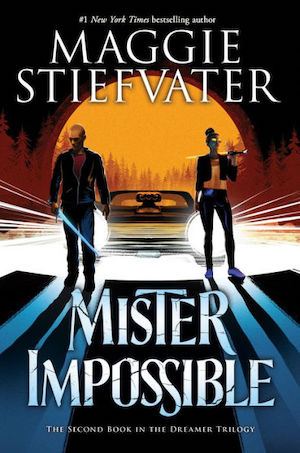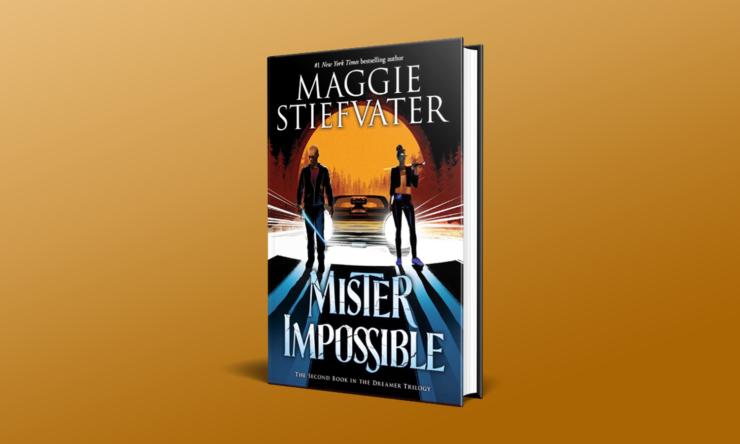In Mister Impossible, the second book of Maggie Stiefvater’s Dreamer Trilogy, Ronan Lynch hits the road with his mentor Bryde and the forger-dreamer Jordan Hennessy. They’re on a quest to restore the leyline energies that have been guttering, killing dreamers and putting their creations to sleep. But problems compound along the way: the Moderators aren’t giving up on their trail, Adam and Declan and Jordan are out of contact with their partners-siblings-dreamers, and all great power comes with consequences. Who’s to say that Ronan’s going in the right direction—and whether Bryde is someone he should be trusting after all?
Stiefvater has crafted an intricately plotted novel that engages with messy ethical conundrums, driven by a cast of fascinatingly amoral characters all aiming to do their version of the right thing at cross purposes. On a thematic level, Mister Impossible also carries a deep-running concern with the purpose of art and the responsibilities of creators to the world around them. Whether painted by Jordan Hennessy or pulled from the dreams of Ronan Lynch, whether cordoned off as a John Singer Sargent portrait in a museum or held in the palm as a slick, strange orb—art is a beautiful, dangerous, alive thing.
As I noted with Call Down the Hawk, the Dreamer Trilogy reads as one big novel split in thirds. So, naturally, the second book kicks the action into higher gear and ends on an absolute bastard of a cliffhanger. For a middle book in a trilogy, it’s exceptionally well-paced. Stiefvater doesn’t linger with one character for long, instead flitting and circling between them; she weaves the narrative across disparate points of view that bridge, contract, and shear off of one another. The removed third-person perspective serves to good effect, allowing the constant intimate conflicts of individual characters to drive the reader forward while the larger narrative coheres like a dream-object appearing in front of their eyes.
The temptation to devour the whole book in one sitting was, I’ll admit, huge—but the prose rewards a more luxurious or methodical reading. Because, as always with Stiefvater, the deftly observed character studies and emotional arcs are what tie my guts in knots—almost more so than in prior novels, given this series’ far more adult points of focus. The book’s got its hauntings; blink and you’ll miss them, but a familiar reader catches the echoes.
Major spoilers follow.
Buy the Book


Mister Impossible
Ronan’s desperate longing to be with someone who understands him carries over from the prior book and, implicitly, all the way back to his teenage liaison with Kavinsky. The revelation that Ronan’s subconscious desire for “the promise of another dreamer who’d actually known what he was doing,” for a mentor who’d be able to guide him, manifested Bryde and therefore led him to collect Hennessy—a forger herself—is wrenching. At the core of Ronan’s maturing story is his exhausted need to be less alone in the world and to be able to follow someone. Declan observes that his brother isn’t a leader by nature in his chat with Carmen, and he’s right.
However, while Ronan has been conducting acts of ecoterrorism, sleeping in his imperceptible car and dodging murder attempts, the world has continued to turn for the other characters. Declan is becoming a man who chases his own wants instead of performing a role while Matthew learns to be a person; Carmen falls in love with her Visionary and decides to forge her own path; Adam has adopted a persona that allows him the visible success he craves. But in a book so concerned with art as a manifestation of self, with dreaming as both metaphor and concrete reality, it’s Hennessy’s and Jordan’s arcs that caught me most. As a pair they strike a chord somewhere between siblings and clones, but their differing experiences allow for a thoughtful, divergent exploration of trauma and healing.
After all, one of the major thematic question Stiefvater tackles in this series is, what’s the purpose of making art? Sweetmetals, for example, are pieces so imbued with the passionate attachments of their artists that they’re able to wake dreamed creatures and give them the chance to flourish. That’s making a fairly obvious point. However, the novel also delves deep into the “special kind of relationship between an artist and a piece of art, on account of the investment,” be that investment emotional or technical or temporal. In part, Mister Impossible is a love-letter to the arts that tenderly prods at relationships between creativity, self, and healing.
For example, Hennessy struggles with the lingering effects of childhood abuse and neglect which manifest as the Lace, a nigh-on-demonic nightmare presence. It’s a physical representation of her terror that she is forgettable, unlovable, and that no one would ever want to keep her—made more awful by her assumption that Jordan has left for good. Meanwhile, Jordan circles the question of self-creation as she attempts to paint her first true original, drawn from her attachment to Declan and her desire to be her own person. Hennessy, though, feels she can’t create something worthwhile on her own in the repeating cycle of unresolved trauma. And that leads her, during a climactic confrontation between dreamers, to create an object that kills the leyline.
As for that ending: I’m still gnawing over the final chapters wondering what the fuck is going on. Which is, of course, the whole point! Stiefvater set up a chess game throughout the book and then upended the board at the conclusion, catching the reader from behind as surely as Hennessy did Ronan. The dilemma the book is working through, whether a world with all tech and no magic or all magic and no tech is better, has intriguing ethical implications I’m curious to see unfold. Ronan’s decision to forge an alternate path feels alive in its rejection of the tech/magic binary… except then he fails.
After Hennessy kills the leyline, Ronan doesn’t wake up—but Bryde, his dreamt teacher-self, is still alive and kicking. Meanwhile, Declan and Adam are going to need to deal with their accidental part played in handing Ronan over to the Moderators. Given this brutally disorienting ending I’m desperate to see where the last book takes us, what the outcomes will be for the dreamers and the dreamed both. Closure isn’t the name of the game in Mister Impossible, so I suppose we’ll just have to settle in and wait for the final act, but for a middle book it’s got phenomenal drive—and thoroughly demonstrates the technical skill with narrative and emotional arcs that I expect from Stiefvater.
Mister Impossible is available from Scholastic.
Lee Mandelo is a writer, critic, and editor whose primary fields of interest are speculative fiction and queer literature, especially when the two coincide. They have two books out, Beyond Binary: Genderqueer and Sexually Fluid Speculative Fiction and We Wuz Pushed: On Joanna Russ and Radical Truth-telling, and in the past have edited for publications like Strange Horizons Magazine. Other work has been featured in magazines such as Stone Telling, Clarkesworld, Apex, and Ideomancer.










